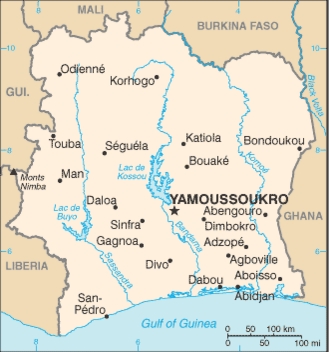ABIDJAN, Ivory Coast -- As he watched children and teenagers play soccer in the courtyard of apartment buildings with faded facades, Moussa Damiba recalled better days here. Lots of white people lived in these buildings before the crisis, the 32-year-old said. "The crisis" is the catch-all term used to describe the years of instability, defined by a coup d'etat, a country-dividing civil war and political violence. But Damiba worries about the future too after last month's attempted assassination of Guillaume Soro, the leader of the rebel New Forces who is now Ivory Coast's prime minister. When Soro's plane landed in Bouake, his stronghold in the rebel-controlled north, it came under rocket attack, killing four people.
Assassination Attempt on Rebel Leader Raises Tension in Ivory Coast

